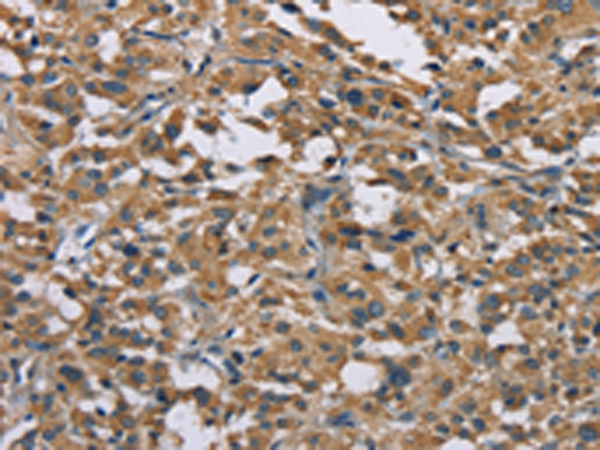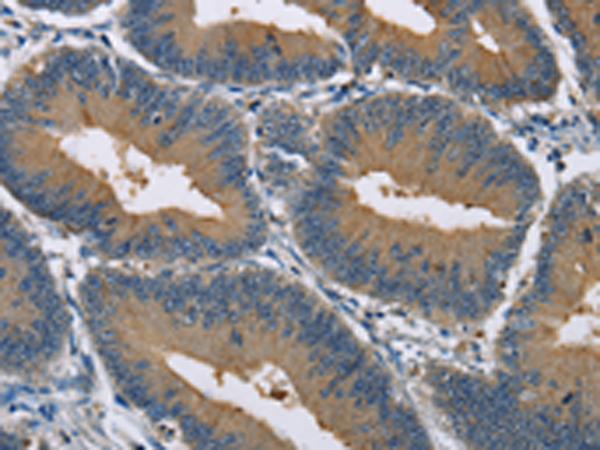

| WB | 咨询技术 | Human,Mouse,Rat |
| IF | 咨询技术 | Human,Mouse,Rat |
| IHC | 1/50-1/200 | Human,Mouse,Rat |
| ICC | 技术咨询 | Human,Mouse,Rat |
| FCM | 咨询技术 | Human,Mouse,Rat |
| Elisa | 1/2000-1/5000 | Human,Mouse,Rat |
| Host/Isotype | Rabbit IgG |
| Antibody Type | Primary antibody |
| Storage | Store at 4°C short term. Aliquot and store at -20°C long term. Avoid freeze/thaw cycles. |
| Species Reactivity | Human, Mouse |
| Immunogen | Fusion protein of human GAB1 |
| Formulation | Purified antibody in PBS with 0.05% sodium azide and 50% glycerol. |
+ +
以下是关于GAB1抗体的3篇参考文献及其摘要概括:
1. **《Grb2-associated binder1 (Gab1) regulates postnatal ischemic and VEGF-induced angiogenesis through the protein kinase A-endothelial NOS pathway》**
- **作者**:Takahashi, S., et al.
- **摘要**:该研究利用GAB1特异性抗体,通过免疫印迹和免疫组织化学技术,揭示了GAB1在小鼠血管生成中的关键作用。结果表明,GAB1通过调节蛋白激酶A和内皮型一氧化氮合酶(eNOS)通路,影响缺血和VEGF诱导的血管新生。
2. **《Role of the Gab1 Dockable site in Kitl/c-Kit signaling and early hematopoiesis》**
- **作者**:Rösel, M., et al.
- **摘要**:本研究通过GAB1抗体进行免疫共沉淀和免疫荧光分析,探讨GAB1的Dockable结构域在Kit配体/c-Kit信号通路中的功能。发现该结构域缺失会破坏GAB1与下游效应分子(如PI3K)的相互作用,导致造血干细胞发育异常。
3. **《Gab1 is required for metastatic signaling through stromal fibroblasts》**
- **作者**:Lamorte, S., et al.
- **摘要**:研究使用GAB1抗体在乳腺癌模型中分析其表达及定位,发现肿瘤相关成纤维细胞(CAFs)通过分泌HGF激活GAB1-MAPK信号轴,促进癌细胞侵袭。GAB1的敲除显著抑制体内转移,表明其作为潜在治疗靶点。
这些文献均通过GAB1抗体的实验手段(如Western blot、免疫共沉淀等),揭示了GAB1在血管生成、造血及肿瘤转移中的分子机制。如需具体期刊信息或DOI,可进一步检索作者及标题获取原文。
The GAB1 (Grb2-associated binder 1) antibody is a crucial tool for studying the role of GAB1. a scaffolding adapter protein involved in multiple intracellular signaling pathways. GAB1 serves as a downstream mediator of receptor tyrosine kinases (RTKs), cytokine receptors, and integrins, facilitating signal transduction by recruiting effector molecules like phosphatidylinositol 3-kinase (PI3K), SHP2 tyrosine phosphatase, and Crk through its phosphorylated tyrosine residues. Structurally, it contains a pleckstrin homology (PH) domain for membrane localization, proline-rich motifs for SH3 domain interactions, and tyrosine phosphorylation sites for SH2 domain binding.
GAB1 antibodies are widely used in research to detect protein expression, phosphorylation status, and subcellular localization via techniques like Western blotting, immunoprecipitation, and immunofluorescence. These antibodies help elucidate GAB1's role in regulating cellular processes such as proliferation, differentiation, and apoptosis. Dysregulation of GAB1 is implicated in cancer, cardiovascular diseases, and developmental disorders, making it a potential therapeutic target. For example, aberrant GAB1 signaling has been linked to RTK-driven cancers (e.g., breast, lung) due to its interaction with MET, EGFR, and other oncogenic receptors. Researchers also utilize GAB1 antibodies to study its tissue-specific functions, such as cardiac development or liver regeneration. Validation of antibody specificity through knockout controls is critical, as cross-reactivity with related proteins (e.g., GAB2/GAB3) may occur.
×